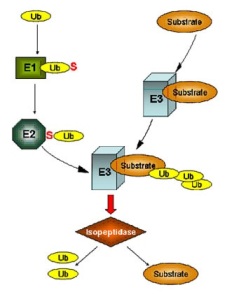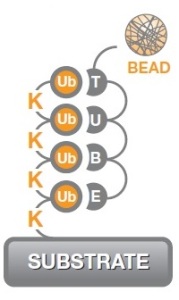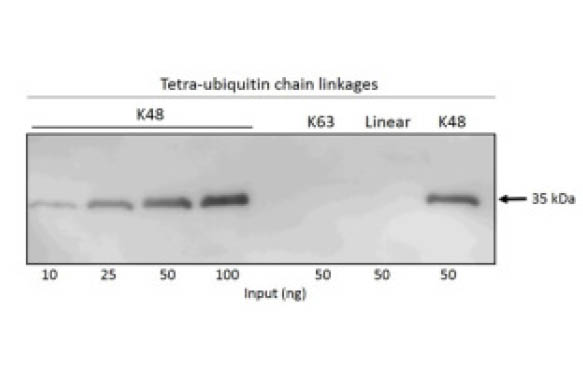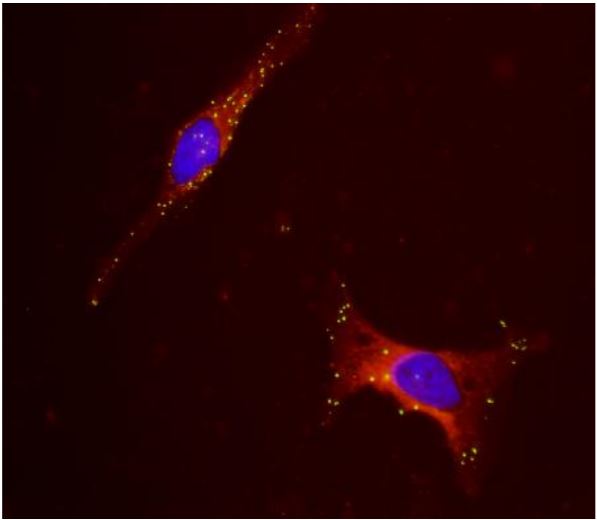Ubiquitination is a common post translational protein modification that occurs through an isopeptide linkage between the C-terminus of ubiquitin and the ε-amino group of a lysine residue on the target substrate. Ubiquitin itself has seven Lys residues (K6, K11, K27, K29, K33, K48, and K63), each of which can participate in further ubiquitination, generating poly-Ub chains. The ability of Ubiquitin to form polymers through various lysines as well as its NH2-terminus appears to be central to the versatility of this system in regulating a variety of cellular processes.
Different Ubiquitin linkages code for different cellular process involvements

Emerging evidence suggests that different polyUb linkages regulate a variety of cellular processes. K48 polyUb chains regulate protein levels by signaling a target protein for degradation by the proteosome. K63 chains are involved with processes such as endocytic trafficking, inflammation and DNA repair while K11-linked polyUb chains are implicated in mitotic regulation and endoplasmic reticulum associated degradation (ERAD). Therefore, it is increasingly clear that different polyUb linkages convey different information to the cell. A major hurdle determining the role of specific Ubiquitin linkages in cancer related pathways is the fact that there is no straight forward method to determining the exact nature of ubiquitination of a target protein.
Most of the antibodies claiming to be linkage specific do not really deliver what they promise. Development of reliable polyUb selective tools will revolutionize the field of ubiquitin.
New K48 and K63 specific tools
LifeSensors very recently launched a tool specific for K48 polyUb chains on target proteins. This tool perfectly complements their K63 polyUb specific tool which has been on the market for quite a while. With both detection tools you now have the possibility to differentiate between the most prominent linkage types K63 and K48.
What kind of “tool” are we talking about?

It’s not about “specific” antibodies – it’s about TUBEs (Tandem Ubiquitin Binding Entities).
TUBEs are essentially tandem UBAs (Ubiquitin Binding Associated domains) with dissociation constants for tetra-ubiquitin in the nanomolar range. TUBEs have also been demonstrated to protect proteins from both deubiquitination and proteasome-mediated degradation, even in the absence of inhibitors normally required to block such activity. The nanomolar affinity of TUBEs for poly-ubiquitinated proteins allows the efficient isolation and identification of ubiquitinated proteins from cells, tissues and organs.
To learn more about TUBEs, their benefits and potential applications TUBEs (WB, pull downs, histochemistry, fluorescence microscopy), take a look at TUBEs – efficiently detect & purify poly-ubiquitinated proteins.
Results with K63- and K48 specific TUBEs

The specificity of Anti-K48 TUBEs can be seen in Fig. 3. Here it is clearly shown that Anti-K48 TUBE “sees” tetra ubiquitin chains linked via K48, but not chains linked via K63 or linked linearly.

On the other hand Anti-K63 TUBEs are very selective for K63 polyUb chains as compared to K11 and K48 chains (see Fig. 4). In the Western blot shown you also see the comparison with a K63 “specific” monoclonal antibody offered by a competitor. While indeed the antibody does not seem to detect K48 chains, there is significant cross-reactivity with K11 chains.
Which linkage specific TUBE variants are available?
Dependent on your application you can choose between:
Anti K63 TUBEs
- Anti-K63 TUBE, Biotin – for the detection of K63-poly-ubiquitinated proteins by ligand blotting (“far western blotting”)
- Anti-K63 TUBE, Flag – for the identification and characterization of K63-poly-ubiquitinated proteins
- Anti-K63 TUBE, Fluorescein-labeled and – Anti-K63 TUBE, TAMRA-labeled – for cytochemical stainings of K63-poly-ubiquitinated proteins with fluorescence microscopy
Anti K48 TUBEs
- Anti-K48 TUBE, Biotin – for the detection of K48-poly-ubiquitinated proteins by ligand blotting (“far western blotting”)
- Anti-K48 TUBE, Flag and Anti-K48 TUBE, His6 – for the identification and characterization of K48-poly-ubiquitinated proteins
- Anti-K48 TUBE, Agarose – for “one-step” pull downs of K48-poly-ubiquitinated proteins
If you need more information or have any questions concerning linkage-specific TUBEs, get in touch through the form below.



